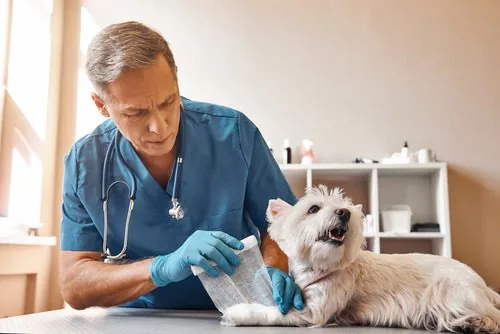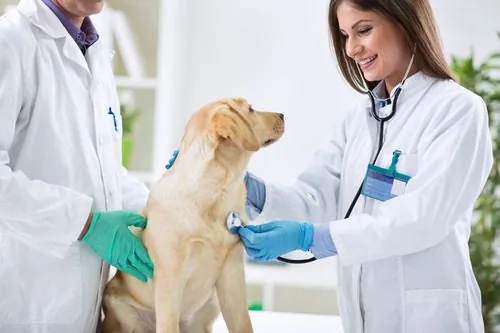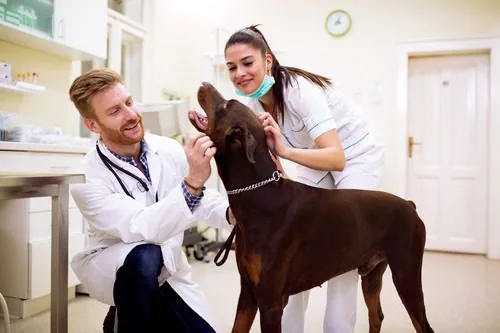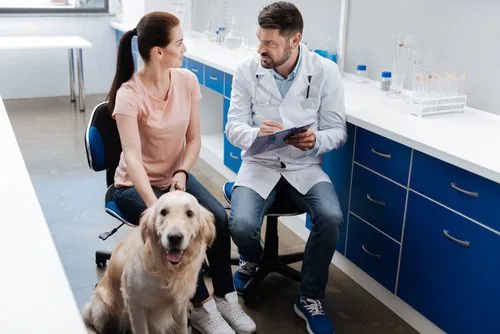Stages of Pregnancy in Dogs
Like most other mammals, dogs can get pregnant if they have not been spayed and have mated with an intact male during their heat cycle. In some cases, finding out that your dog is pregnant can be an exciting time; for others, it can be incredibly stressful.
There are about five stages of pregnancy in dogs. They include the dog’s heat cycle and impregnation, the two months of pregnancy, and labor and delivery. Throughout this time it is best to provide your dog with veterinary care.
In this article, we will be describing all of the stages of pregnancy in dogs. We will also be answering some commonly asked questions about canine pregnancy and describing how you can tell when a dog is pregnant. Let’s get right into it!
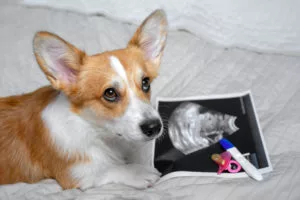
How Long are Dogs Pregnant?
Dogs are pregnant for around two months. Each month will have different signs and symptoms of pregnancy associated with it.
The Stages of Pregnancy in Dogs
There are about five stages of pregnancy in dogs. These stages include the two months of pregnancy along with the dog’s heat cycle and labor. Here are the five stages of pregnancy for dogs.
Stage 1: The Dog Goes Into Heat and is Impregnated
The beginning of every canine pregnancy involves the dog going into heat. When a dog is in heat they are reaching their fertile window where they can become impregnated. You can usually tell when a female dog is in heat, because they will emit bloody vaginal discharge at the beginning of their heat cycle.
When the female dog reaches the point of ovulation she will likely attempt to mate with male dogs. If she successfully mates with an intact male dog during this period, then there is a decent chance that she will become pregnant.
Stage 2: Month 1 of Pregnancy 
If the dog has been successfully impregnated, then she will reach her first month of pregnancy. During this stage, the fetuses are just forming. Usually, there are not many noticeable signs of pregnancy during the first month, if any at all. Some dog owners claim to notice the following signs of pregnancy in the first month.
- An increase in appetite
- Enlarged nipples
- Being more lazy than usual
- Being extra affectionate with members of the household
- Clear vaginal discharge
- Morning sickness
While some dog owners claim that they notice the above early symptoms of pregnancy in their dogs, it is not a guarantee. You may not notice any signs of pregnancy in your dog in the first month.
Stage 3: Month 2 of Pregnancy
You will most likely start to notice signs of pregnancy in your dog in the second month. This is essentially the dog equivalent of being in the second trimester of pregnancy. During this stage, the fetuses are starting to look more like newborn puppies, though they are still developing. Some symptoms of pregnancy that occur during the second month include:
- An increased appetite (more noticeable than in month one) at the beginning of month 2, then a decreased appetite at around day 45.
- Weight gain
- An increase in urination
- Changes in behavior
- Clear vaginal discharge
- An enlarged abdomen that is firm to the touch (middle to end of month 2)
- Visible puppy movements in the abdomen (at the end of month 2)
This is when most dog owners suspect that their dog may be pregnant, and this is often the stage where veterinarians diagnose pregnancy.
Stage 4: Final Days of Pregnancy
The third month of pregnancy really only lasts a few days in dogs, and during this time dogs are preparing for labor. Here are some things that will likely occur during the end of a dog’s pregnancy:
- Restless behavior (pacing, excessive panting, etc.)
- Shivering
- A reduced appetite
- A drop in body temperature (a sign that labor is near)
During this stage, it is best to prepare a whelping box and get you and your dog ready for the labor and delivery stage.
Stage 5: Labor and Delivery
This stage involves the birth of newborn puppies. During the beginning of this stage, the dog will experience contractions. While these contractions are not visible to the dog owner, there are other ways to tell if a dog has gone into labor. Here are some of the most common signs:
- Restless or reclusive behavior
- Other behavioral changes
- Excessive panting
- Vomiting and not eating
- Nesting
Next, the dog will deliver the puppies. Most puppies are delivered every 30 to 60 minutes. However, this process can sometimes take longer. No delivery should last longer than one to two hours. It’s a good idea to let a veterinarian know that your dog is in labor before delivery. This way you can take them to the vet quickly if any issues occur.
Once all puppies have been delivered, the placentas will be delivered next. There should be one placenta for each puppy. Labor is finished once every placenta has been delivered.
How Can Vets Tell if a Dog is Pregnant?
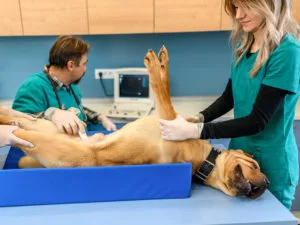
Vets can perform a number of tests that can diagnose pregnancy in dogs. Here are the different ways that veterinarians can diagnose pregnancy in dogs.
Hormone Tests
Vets can diagnose pregnancy through a hormone test. This tests for the hormone Relaxin, but the dog must be at least 30 days pregnant for the test to be accurate.
Palpation
This test involves the vet feeling for embryonic sacs at around week 3 or 4 of pregnancy.
Ultrasound
Pregnancy in dogs can be diagnosed through ultrasound between days 25 and 35 of pregnancy. This is the best way to find out if your dog is pregnant early on.
X-Ray
X-Rays are mostly used in the last stages of pregnancy to find out approximately how many puppies the dog will be having. X-Rays are rarely used to diagnose pregnancy as a result.
What Should You do if Your Dog is Pregnant
You should take your dog to the vet if you suspect that they are pregnant. This will not only let you know for sure, but it will also prepare you for your dog’s labor and delivery. Many different complications can occur during this process, and these can be life-threatening and require emergency veterinary care. Giving your vet a heads up can prepare them to jump in and help your dog if they need it.
For dog parents in Winter Haven, Florida, Veterinary Healthcare Associates is here to help you and your pup. Give us a call at 863-324-3340 or make an appointment online!
Recent Posts
Working at a 24/7 Emergency Veterinary Practice
Working at a 24/7 Emergency Veterinary Practice Working at a 24/7 emergency veterinary practice is a unique…
Do Veterinarians Have a Good Work-Life Balance?
Do Veterinarians Have a Good Work-Life Balance? When it comes to the dedicated professionals who care for…
6 Reasons to Work in a Specialty Referral Veterinary Practice
6 Reasons to Work in a Specialty Referral Veterinary Practice Working in the veterinary field is incredibly…
Is Being an Oncology Veterinarian a Rewarding Career?
Is Being an Oncology Veterinarian a Rewarding Career? Choosing a career path in veterinary medicine opens the…
Canine Water Treadmill Therapy
Canine Water Treadmill Therapy Welcome to our informative guide on Canine Water Treadmill Therapy. This revolutionary rehabilitation…
About Veterinary Healthcare Associates
Veterinary Healthcare Associates in Winter Haven, FL, was established over 30 years ago as Maxwell Animal Clinic by Dr. John Maxwell. Maxwell Animal Clinic was a one-doctor general practice offering preventive care, dentistry, and standard surgical services to the community. As the years passed, Maxwell Animal Clinic evolved into a thriving 10-doctor general, specialty referral, and emergency veterinary practice.

